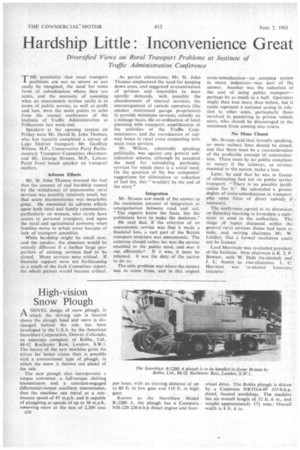Hardship Little : Inconvenience Great
Page 60

If you've noticed an error in this article please click here to report it so we can fix it.
Diversified Views on Rural Transport Problems at Institute of Traffic Administration Conference
1-17 HE possibility that rural transport
problems are not so severe as can easily be imagined, the need for some form of subsidization where they are acute, and the necessity of assessing what an uneconomic service really is in terms of public service, as well as profit and loss, were the main points to arise from the annual conference of the Institute of Traffic Administration at Folkestone last week-end.
Speakers at the opening session on Friday were Mr. David St. John Thomas. who has recently completed a survey of Lake District transport; Mr. Geoffrey Wilson, M.P., Conservative Party Parliamentary Transport Committee chairman; and Mr. George Strauss, M.P., Labour Party front bench speaker on transport matters.
Adverse Effects.
Mr. St. John Thomas stressed the fact that the amount of real hardship caused by the withdrawal of uneconomic rural services was possibly relatively small, but that acute inconvenience was invariably great. He examined its adverse effects upon both rural and family communities, particularly on women, who rarely have access to personal transport. and upon the rural and agricultural economy when families move to urban areas because of lack of transport amenities.
While hardship might be small now, said the speaker, the situation would be entirely different if a further large proportion of existing services had to be closed. Many services were critical. If financial support were not forthcoming as a result of the Jack Committee report. the whole picture would become critical. As partial alleviations, Mr. St. John Thomas emphasized the need for keeping down costs, and suggested re-examination of services and timetables to meet specific demands, with possibly the abandonment of interval services; the encouragement of outside operators (the speaker mentioned garage proprietors) to provide minimum services; subsidy on a mileage basis; the co-ordination of local planning with transport; amplification of the activities of the Traffic Commissioners; and the introduction of railway buses in rural areas connecting with main train services.
Mr. Wilson, admittedly speaking politically, was against any general subsidization scheme, although he accepted the need for subsidizing particular services for which there is a social need. On the question of the bus companies' suggestions for elimination or reduction of fuel tax, this "wouldn't be the end of the story."
Integration
Mr. Strauss saw much of the answer in the maximum amount of integration or amalgamation between road and rail. "The experts know the facts, but the politicians have to make the decisions."
He said that, if the criterion of an uneconomic service was that it made a financial loss, a vast part of the British transport structure was uneconomic. The criterion should rather be: was the service essential to the public need, and was it run efficiently? If it was, it must be retained. It was the duty of the nation to do so.
The only problem was where the money was to come from, and in this respect cross-subsidization—an accepted system in many industries—was part of the answer. Another was the reduction of the cost of using public transport— perhaps by as much as a half. Operators might then lose mare than before, but it could represent a national saving in relation to other costs, particularly those involved in pandering to private vehicle users, who should be discouraged to the maximum from coming into towns.
No More Closed
Mr. Strauss said that, broadly speaking. no more railway lines should be closed, and that there must be a reconsideration of the profitable concept of nationalization. There must be no public complaint or outcry if the railways, as services essential to the nation, make a loss.
Later, he said that he was in favour of eliminating fuel tax on public service transport. " There is no possible justification for it." He advocated a greater degree of cross-subsidization in transport. plus some form -of direct subsidy .if necessary.
The conference agreed at its discussion on Saturday morning to formulate a statement to send to the authorities. The range of topics discussed = within the general rural services theme had been so wide, said retiring chairman Mr. W. Lindley, that a formal resolution could not be framed.
Lord Merrivale was re-elected president of the Institute. New chairman is K. J. P. Bowyer, with W. Dale (re-elected) and J. L. Austin as vice-chairmen. L. C. Harrison was re-elected honorarytreasurer.
















































































































































































